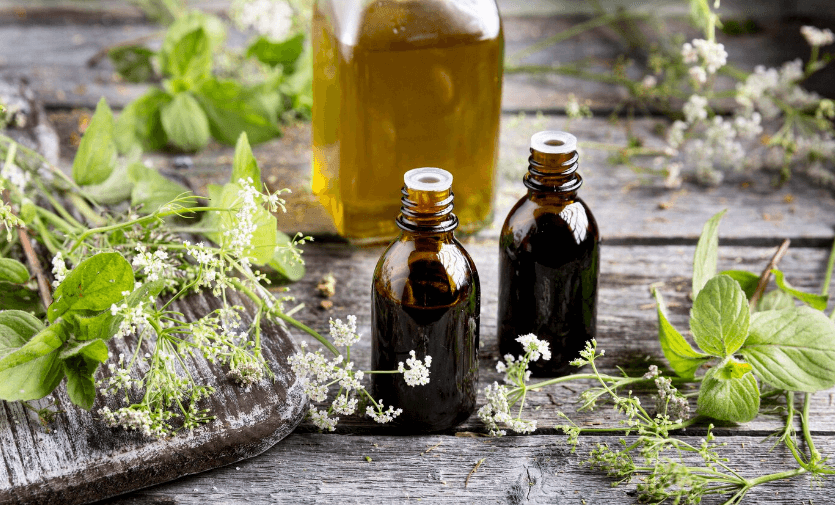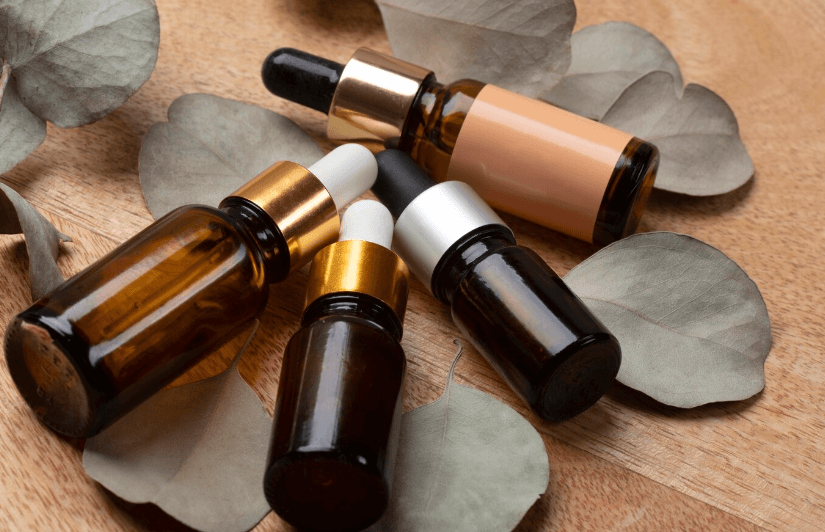Do you think your go-to culinary item can become your hair idol? We’ll review safety issues, the research underlying thyme oil’s possible benefits for hair growth, and how to make your own at-home Thyme Oil Hair Growth Recipe infusion. Let’s explore the contents of your cupboard and see whether thyme oil for hair growth can be your unique route to healthier, thicker hair!
Thyme oil is a natural treatment against hair loss and promotes hair growth. Homemade thyme oil hair growth recipe can easily be prepared by infusing fresh or dried thyme leaves in a carrier oil, preferably olive, coconut, or almond oil. The simple process involves mixing thyme leaves with your chosen oil and letting the mixture infuse for weeks, as we’ve seen.
Thyme Oil Hair Growth Recipe can be applied to the scalp and hair as a massage oil, a hair mask, or a rinse. For even more benefits, you can combine thyme oil with other essential oils, such as lavender, rosemary, or cedarwood.
Although generally safe, the Thyme Oil Hair Growth recipe can irritate some people or trigger allergic responses in others. Always do a patch test before using it, and consult your doctor if you have any medical conditions or are pregnant or breastfeeding.
A neem comb can even help with hair growth, as it significantly enhances blood circulation and also helps reduce scalp infections. All these natural remedies combined create one effective routine for controlling healthier, stronger hair.
What is Thyme Oil, and Why is it Good for Hair Growth?

Thyme oil is an essential oil produced from the leaves and blossoms of the thyme plant, a member of the mint family. Its perfume is potent, spicy, and herbaceous, awakening the senses and the intellect.
Thyme oil is good for cooking, aromatherapy, and hair growth. Thyme oil has many properties that can benefit the hair, such as :
How to Make Thyme Oil Hair Growth Recipe?

Making Thyme Oil Hair Growth Recipe at home is easy and inexpensive. All you need are some fresh or dried thyme leaves and a carrier oil of your choice. Essential oil can be safely and effectively used on skin and hair by diluting and transferring it with a base oil known as a carrier oil. Some examples of carrier oils are olive oil, coconut oil, almond oil, jojoba oil, and grapeseed oil.
Here are the steps to make Thyme Oil Hair Growth Recipe at home:
- Wash and dry the thyme leaves thoroughly. If you use fresh thyme, you can use the whole sprigs or strip off the leaves. You can use whole or crushed leaves if you use dried thyme.
- Fill a glass jar with the thyme leaves, leaving some space at the top. You can use any size jar depending on how much oil you want to make.
- Pour the carrier oil over the thyme leaves, making sure they are completely submerged. You can use any ratio of thyme to oil, but a general rule of thumb is to use one part thyme to four parts oil.
- Tightly close the container and give it a good shake to combine the ingredients.
- Place the jar in a sunny location, such as a windowsill, and let it infuse for two to four weeks. Shake the jar daily to help the oil absorb the thyme essence.
- After the infusion, filter the oil through a cheesecloth or fine mesh screen into a clean glass bottle. Discard the thyme leaves or use them for composting.
- Label the bottle with the date and keep it in a cool, dark, and dry location.
Fresh thyme has greater strength. Use two to three tablespoons of dried thyme or double the amount.
How to Use Thyme Oil Hair Growth Recipe for Hair Growth

Thyme Oil Hair Growth Recipe can be used in various ways, depending on your preferences and hair type. Here are some of the most common methods:
A few drops of thyme oil and a tablespoon of carrier oil are added to your scalp and hair. Leave it on for 15 to 30 minutes, then wash it off with a mild shampoo and conditioner. You can do this once or twice weekly to stimulate hair growth and prevent loss.
Mix a few drops of thyme oil with a quarter cup of carrier oil and honey. Apply the mixture to your scalp and wear a towel or a shower cap over your hair. After an hour, rinse it with warm water, shampoo, and conditioner. Do this once a week to nourish and moisturize your hair and scalp.
Mix a few drops of thyme oil with a cup of water and use it as a final rinse after washing your hair. You can do this every time you wash your hair to add shine and fragrance to your hair.
Apply diluted thyme oil as a leave-in treatment before bed and wear a shower cap to prevent staining pillows. Wash your hair thoroughly in the morning.
How to Enhance Thyme Oil with Other Essential Oils

Thyme oil can be mixed with other essential oils to enhance its effects and create different aromas. Some of the best essential oils to mix with thyme oil for hair growth are :
For potentially stronger results, try mixing your diluted thyme oil for hair growth with additional nutritious carrier oils, such as rosemary or peppermint.
Essential Oil Benefits for Hair Growth
- Lavender oil Promotes hair growth, reduces hair loss, soothes scalp inflammation, and adds shine and softness to hair.
- Rosemary oil Stimulates hair growth, prevents hair loss, improves scalp circulation, and fights against dandruff and scalp infections.
- Cedarwood oil Stimulates hair growth, reduces hair loss, balances scalp oil production, and treats scalp dryness and itchiness.
To make a blend of thyme oil and other essential oils, you can follow this recipe:
- Add ten drops of thyme oil, ten drops of lavender oil, ten drops of rosemary oil, and ten drops of cedarwood oil to a small glass bottle.
- To thoroughly blend the oils, shake the bottle.
- Add a few drops of the blend to a tablespoon of carrier oil and use it as a massage oil, a hair mask, or a rinse, as described above.
Precautions and Tips for Using Thyme Oil Hair Growth Recipe
The Thyme Oil Hair Growth Recipe is generally safe, but it may cause some side effects or interactions in some people. Here are some precautions and tips for using thyme oil safely and effectively:
Depending on how sensitive your scalp is, start with a tiny amount of diluted thyme oil and work your way up. Refrain from drowning your hair strands.
Conclusion
Thyme oil for hair growth is a natural medicine that stimulates hair growth and prevents loss. Thyme oil can be made at home by infusing fresh or dried thyme leaves in a carrier oil. Thyme oil can be applied to the scalp and massage your head for hair growth. Thyme oil can be combined with other essential oils, such as lavender, rosemary, or cedarwood, to reap additional advantages. Generally safe, thyme oil can irritate some people or trigger allergic responses in others. Always do a patch test before using it, and consult your doctor if you have any medical conditions or are pregnant or breastfeeding.
I hope you learned something new. If you have any questions or comments, please share them below. Thank you for reading, and happy hair growth!
Frequently Asked Questions about Thyme Oil for Hair Growth
How long does it take to see results from Thyme Oil Hair Growth Recipe?
There is no definitive answer to how long it takes to see results from thyme oil for hair growth, as different people may have different hair growth rates and responses to the oil. Therefore, the best way to use thyme oil for hair growth is to be consistent, patient, and realistic. Thyme oil may only work for some, and it may take several weeks or months to see noticeable results. Thyme oil, however, can provide additional benefits for your hair and scalp, such as reducing dandruff, irritation, and infection while adding shine and scent. Thyme oil is a natural and safe solution that might help you attain thicker, fuller hair.
How can I ensure the thyme oil is pure and safe to use?
Thyme oil for hair growth is a natural cure that can help encourage hair development and prevent hair loss, but only apply pure and safe oil on your scalp and hair. These are some ways to check the purity and safety of thyme oil. They can provide you with the necessary information and documentation about the oil. You can also ask for a sample of the oil before buying it and do a patch test on your skin to see if you have any allergic reactions or irritation. Thyme oil is potent and beneficial but should be used cautiously and carefully.
Can I use thyme oil on my skin, too?
Thyme oil is a natural oil with many benefits for the skin. Before using it more widely, test a patch on a tiny section of your skin. Wait 24 hours to observe whether you get any allergy symptoms, such as redness, itching, swelling, or rash. If you do, do not use thyme oil and seek medical attention if needed.
Does applying Thyme Oil Hair Growth Recipe have any adverse effects?
Although thyme oil is generally safe, allergic reactions or skin irritations can occur in certain people. Before applying thyme oil extensively on the scalp, it is imperative to dilute it appropriately and conduct a patch test.

